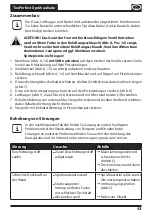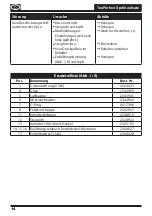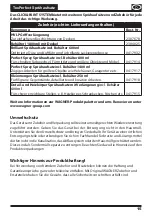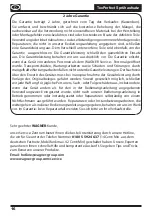
GB
5
TexPerfect spray attachment
Assembly
i
The nozzle, air cap and needle are optimally adjusted to suit each other. Do not
combine components from different spray attachments, as the components
could be damaged.
CAUTION! The units may only be used with a functional valve. If paints
rises in the ventilating hose (Fig. A, item 16) do not operate the unit
further! Dismantle and clean the ventilating hose, valve and diaphragm
and replace the diaphragm if necessary.
Do not lay the spray gun.
1.
Place the diaphragm (fig. A, 14)
with the pin facing upwards
on the bottom section
of the valve. Also see the marking on the gun body.
2.
Place on the valve cover (fig. A, 15) and screw it closed.
3. Place the ventilating hose (fig. A, 16) on the valve cover and on the nipple at the gun
body.
4.
Push the nozzle seal over the needle; the groove (slot) should point towards you
(fig. 7).
5. Place the nozzle on to the gun body with the recess facing downwards. (Fig. 8)
6. Put the air cap (fig. 9, 2) onto the nozzle (3) and tighten it using the union nut (1).
7. Place the container seal from below on the suction tube and slide it over the collar,
while turning the container seal slightly.
8. Insert the suction tube with container seal in the gun body.
Correction of Malfunctions
i
The following table contains information about solving the most frequent
types of problems encountered when using fine plaster and structured
paint. Solutions to further problems can be found in the manual for the
basic device and online at www.wagner-group.com/service.
Problem
Cause
Remedy
Coating material causes
"paint tears"
•
Too much coating
material applied.
➞
Turn material volume
adjusting screw to the
left (-)
➞
Leave it to dry and then
sand down
Poor covering capacity
on the wall
•
Spray material is too cold
•
Highly absorbent surface
or paint with poor
covering capacity
•
Distance too large
➞
The material you are
spraying should be at
room temperature
➞
Cross spray (Fig. 5)
➞
Closer to the object








































